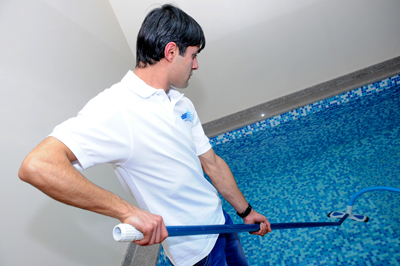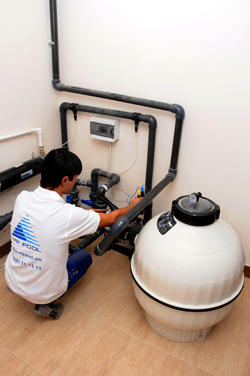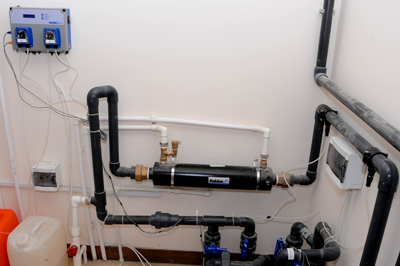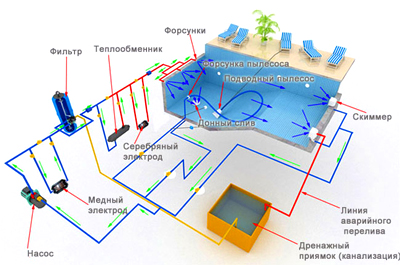Cleaning the pool water, chemicals for swimming pools, maintenance of swimming pools
Clear and clean as well as safe water for the body - it is the natural desire of the owner of any pool - and stationary, and the frame, and inflatable. And the easiestat first sight, the way to achieve this - just replace the water.
This decision will be really relevant for very small pools of up to 1m3. But keep in mind that water typed,
Firstly waterwill be sufficiently cold. You can not go swimming in the pool, but you will have to wait until it warms up, or warm it yourself.
Secondly, depending on the source of water, it may be mechanical or chemical impurities that can adversely affect both the appearance of the swimming pool and at its work equipment and your health eventually.
Third, if in the pool appeared organisms (fungi, algae and bacteria) - you can not get rid of them by simply replacing the water - should be thoroughly cleaned the entire pool using detergents without missing a single centimeter. Although this procedure is not for a long time you will save from fungi, bacteria and algae.
Fourth, the water today is a unique resource that is worth good money.

In today's world to maintain the cleanliness of the pool water using special chemicals that are at correct application and in the absence of individual susceptibility to these substances will help you maintain the cleanliness of the pool water and will not threaten your health and that of your children.
You need to understand that the water in the pool is a living organism that requires meticulous care - care for its needs not just of times, but systematic.
Proposed comprehensive program of applying funds for the care of water guarantees hygienically clean water in the pool and contributes to the destruction of bacteria, fungi, algae, normalization of pH and eliminate the smallest suspended particles that can not catch the pool filter installations.
All products are hygienic conclusions of the Ministry of Health of Armenia.
The water in any pool is inevitably contaminated by organic and inorganic substances. Their source is Environment and bathing people.
Water, which has been treated rapidly becomes cloudy and becomes an ideal environment for the emergence and growth of bacteria and algae.
Walls of the pool are covered slimy coating (I hope you have not felt this unpleasant "slippery" feeling). Turbidity, odor and "slippery" plaque is the first signs of organic pollution. Limescale on the waterline, rusty plaque, foaming water - is it possible call the water with such "features" pure and harmless? I think that each of you will answer "NO!"
Often no less dangerous "pollutant" acts the owner of the pool. Lack of an integrated approach for water treatment, the use of excessive doses of chemicals, the use of mutually exclusive drugs - all this leads to more disastrous consequences for the people.

In Armenia, there were cases when water saturated with copper (copper sources are: copper initially saturated water, immense "passion" copper-based algaecides, faulty disinfection system built on copper ionization) girls recently dyed her hair, as a consequence of a chemical reaction, the color of hair changed to "malachite" green.
In any case, and especially in the preparation and purification of water for the pool should be combined principle measures and systematic approach. This is very important!
Comprehensive care for the pool water can prevent:
occurrence of bacteria, fungi and algae
the output of pH outside the range of values required.
excess / shortage of preparations for cleaning and polluting chemicals
Purification of water in the pool is carried out in two complementary ways - physical and chemical.
Physical treatment is recycling and filtering. With good water circulation in the pool, most of the dirt can stay in a mechanical filter. Dirt particles remaining in the pool despite the filtering can be easily removed with an aqueous cleaner
Chemical cleaning consists of four stages:
Regulating the level of pH. This is a fundamental step, because most of drugs are sensitive to the active hydrogen in the water at elevated or reduced level of drug is not affected by 100%. The right pH level allows the use of a smaller number of agents, providing them with maximum efficiency.
Disinfection of water. Depending on the drug used, there are three methods of disinfection: disinfection based on agents chlorine-based disinfection drugs based on active oxygen disinfection preparations based on bromine
Preventing the appearance of algae. At this stage in water are added drugs called algicides to prevent occurrence of algae, bacteria and fungi in the pool.
 Coagulation (flocculation) - at this stage all that was left after the previous cleaning steps and could not be filtered a fixed the pool filtration system will be cured. Coagulating agent forms in water flake precipitate enveloping tiny dust particles, as well as binding the particles together, deposited on the surface of the flake. "Loaded" mud flakes are already large enough, and fully retained stationary filter basin. Coagulation (flocculation) - at this stage all that was left after the previous cleaning steps and could not be filtered a fixed the pool filtration system will be cured. Coagulating agent forms in water flake precipitate enveloping tiny dust particles, as well as binding the particles together, deposited on the surface of the flake. "Loaded" mud flakes are already large enough, and fully retained stationary filter basin.
Physical pool cleaning (general cleaning) should be performed regularly, not less than once a year. This applies to outdoor and indoor pools.
Even if the water seems to look clean, the walls and floor need to be cleaned from lime deposits , dirt, grease. This will prevent the emergence and development of bacteria and algae. Cleaners from the hardware store or market is better not to use. They contain additives that may cause turbidity water and promote bacterial growth. They can destroy cover line of the pools - inflatable and stationary.
Cleaning the filter is required at least once a week. Backwash sand filter the pool removes accumulated dirt from the filter medium. Quartz sand filter the pool must be changed every 2-3 years. Use a good quality sand with grains, to comply with the producer (manufacturer) pool.
Submission of fresh water in the pool. Even with best service in the pool water gradually accumulate salts which can not be removed by filtration and chemical means. This chlorides and nitrates - the result of the reaction of chlorine , which cause high levels of corrosion of steel and aluminum. Concentration of salts eliminate regular replacement of most or all of the fresh water .
This procedure is carried out once a year for open stationary pools and every 2-3 years for closed . This procedure is necessary even if the water is clean in appearance. For outdoor pools it is better to combine with the spring cleaning.
An obligatory stage after each cleaning the pool water should be checking for water by testers pool. Testers are different - level testers pH, chlorine testers, bromine, active oxygen in the water, testers test hardness and alkalinity of water. Compliance with the correct amounts of chemicals in the water, the level of pH, water hardness will allow you to protect yourself and your family from possible injury, as well as provide long operation of the equipment pool. |





